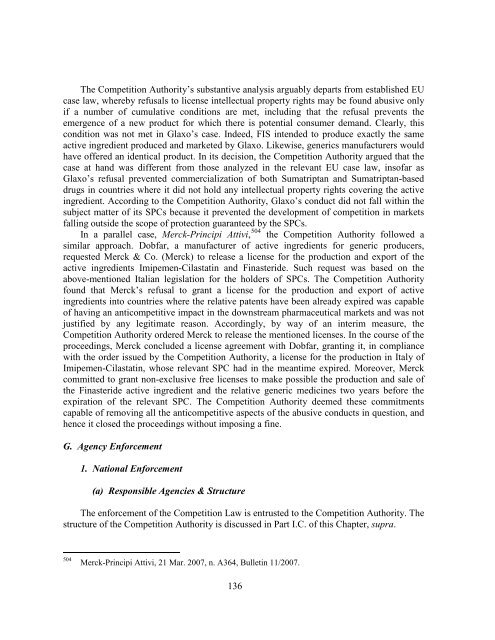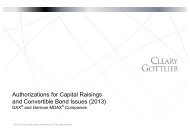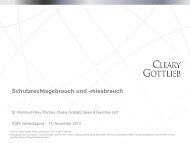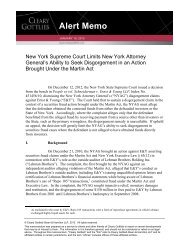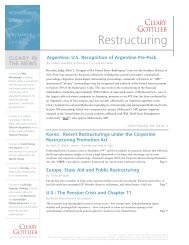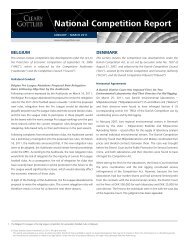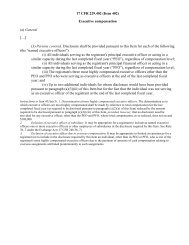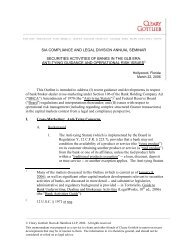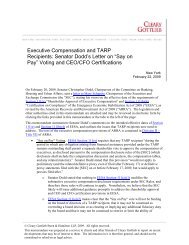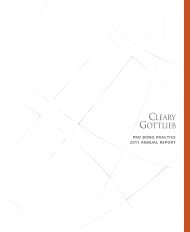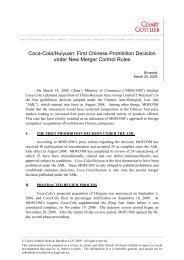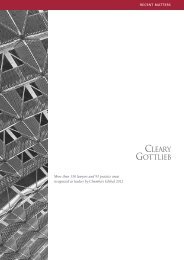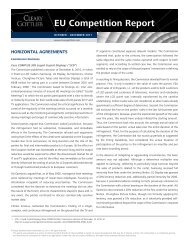Competition Law in Italy The first 20 years of law and practice
Competition Law in Italy The first 20 years of law and practice
Competition Law in Italy The first 20 years of law and practice
Create successful ePaper yourself
Turn your PDF publications into a flip-book with our unique Google optimized e-Paper software.
<strong>The</strong> <strong>Competition</strong> Authority’s substantive analysis arguably departs from established EU<br />
case <strong>law</strong>, whereby refusals to license <strong>in</strong>tellectual property rights may be found abusive only<br />
if a number <strong>of</strong> cumulative conditions are met, <strong>in</strong>clud<strong>in</strong>g that the refusal prevents the<br />
emergence <strong>of</strong> a new product for which there is potential consumer dem<strong>and</strong>. Clearly, this<br />
condition was not met <strong>in</strong> Glaxo’s case. Indeed, FIS <strong>in</strong>tended to produce exactly the same<br />
active <strong>in</strong>gredient produced <strong>and</strong> marketed by Glaxo. Likewise, generics manufacturers would<br />
have <strong>of</strong>fered an identical product. In its decision, the <strong>Competition</strong> Authority argued that the<br />
case at h<strong>and</strong> was different from those analyzed <strong>in</strong> the relevant EU case <strong>law</strong>, <strong>in</strong>s<strong>of</strong>ar as<br />
Glaxo’s refusal prevented commercialization <strong>of</strong> both Sumatriptan <strong>and</strong> Sumatriptan-based<br />
drugs <strong>in</strong> countries where it did not hold any <strong>in</strong>tellectual property rights cover<strong>in</strong>g the active<br />
<strong>in</strong>gredient. Accord<strong>in</strong>g to the <strong>Competition</strong> Authority, Glaxo’s conduct did not fall with<strong>in</strong> the<br />
subject matter <strong>of</strong> its SPCs because it prevented the development <strong>of</strong> competition <strong>in</strong> markets<br />
fall<strong>in</strong>g outside the scope <strong>of</strong> protection guaranteed by the SPCs.<br />
In a parallel case, Merck-Pr<strong>in</strong>cipi Attivi, 504<br />
136<br />
the <strong>Competition</strong> Authority followed a<br />
similar approach. Dobfar, a manufacturer <strong>of</strong> active <strong>in</strong>gredients for generic producers,<br />
requested Merck & Co. (Merck) to release a license for the production <strong>and</strong> export <strong>of</strong> the<br />
active <strong>in</strong>gredients Imipemen-Cilastat<strong>in</strong> <strong>and</strong> F<strong>in</strong>asteride. Such request was based on the<br />
above-mentioned Italian legislation for the holders <strong>of</strong> SPCs. <strong>The</strong> <strong>Competition</strong> Authority<br />
found that Merck’s refusal to grant a license for the production <strong>and</strong> export <strong>of</strong> active<br />
<strong>in</strong>gredients <strong>in</strong>to countries where the relative patents have been already expired was capable<br />
<strong>of</strong> hav<strong>in</strong>g an anticompetitive impact <strong>in</strong> the downstream pharmaceutical markets <strong>and</strong> was not<br />
justified by any legitimate reason. Accord<strong>in</strong>gly, by way <strong>of</strong> an <strong>in</strong>terim measure, the<br />
<strong>Competition</strong> Authority ordered Merck to release the mentioned licenses. In the course <strong>of</strong> the<br />
proceed<strong>in</strong>gs, Merck concluded a license agreement with Dobfar, grant<strong>in</strong>g it, <strong>in</strong> compliance<br />
with the order issued by the <strong>Competition</strong> Authority, a license for the production <strong>in</strong> <strong>Italy</strong> <strong>of</strong><br />
Imipemen-Cilastat<strong>in</strong>, whose relevant SPC had <strong>in</strong> the meantime expired. Moreover, Merck<br />
committed to grant non-exclusive free licenses to make possible the production <strong>and</strong> sale <strong>of</strong><br />
the F<strong>in</strong>asteride active <strong>in</strong>gredient <strong>and</strong> the relative generic medic<strong>in</strong>es two <strong>years</strong> before the<br />
expiration <strong>of</strong> the relevant SPC. <strong>The</strong> <strong>Competition</strong> Authority deemed these commitments<br />
capable <strong>of</strong> remov<strong>in</strong>g all the anticompetitive aspects <strong>of</strong> the abusive conducts <strong>in</strong> question, <strong>and</strong><br />
hence it closed the proceed<strong>in</strong>gs without impos<strong>in</strong>g a f<strong>in</strong>e.<br />
G. Agency Enforcement<br />
1. National Enforcement<br />
(a) Responsible Agencies & Structure<br />
<strong>The</strong> enforcement <strong>of</strong> the <strong>Competition</strong> <strong>Law</strong> is entrusted to the <strong>Competition</strong> Authority. <strong>The</strong><br />
structure <strong>of</strong> the <strong>Competition</strong> Authority is discussed <strong>in</strong> Part I.C. <strong>of</strong> this Chapter, supra.<br />
504 Merck-Pr<strong>in</strong>cipi Attivi, 21 Mar. <strong>20</strong>07, n. A364, Bullet<strong>in</strong> 11/<strong>20</strong>07.


